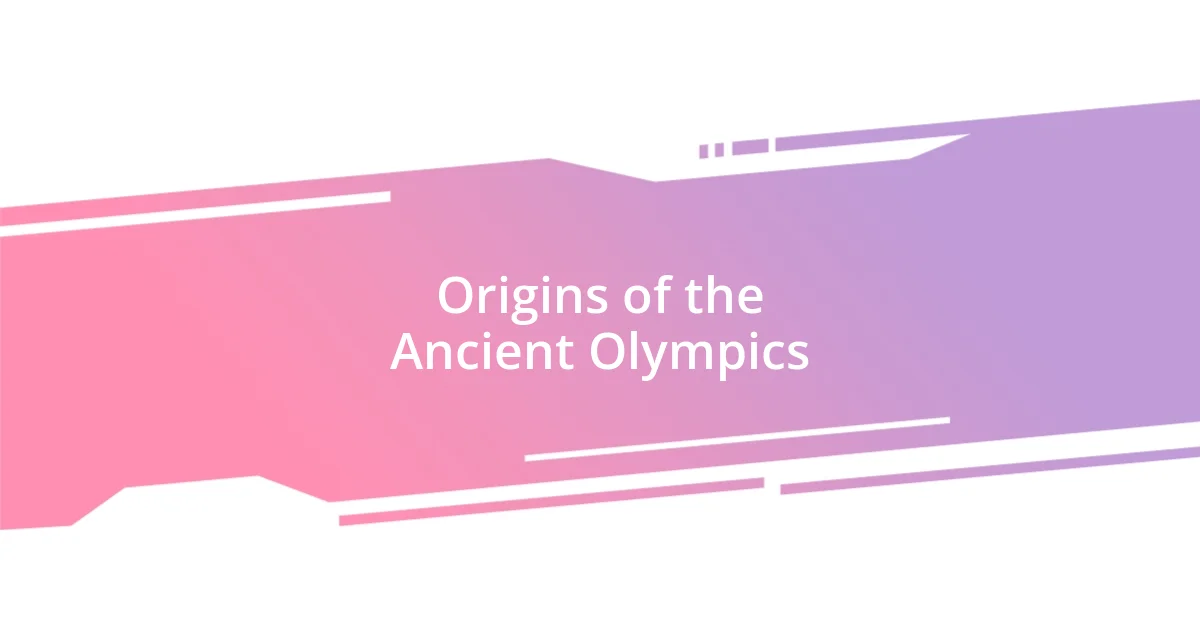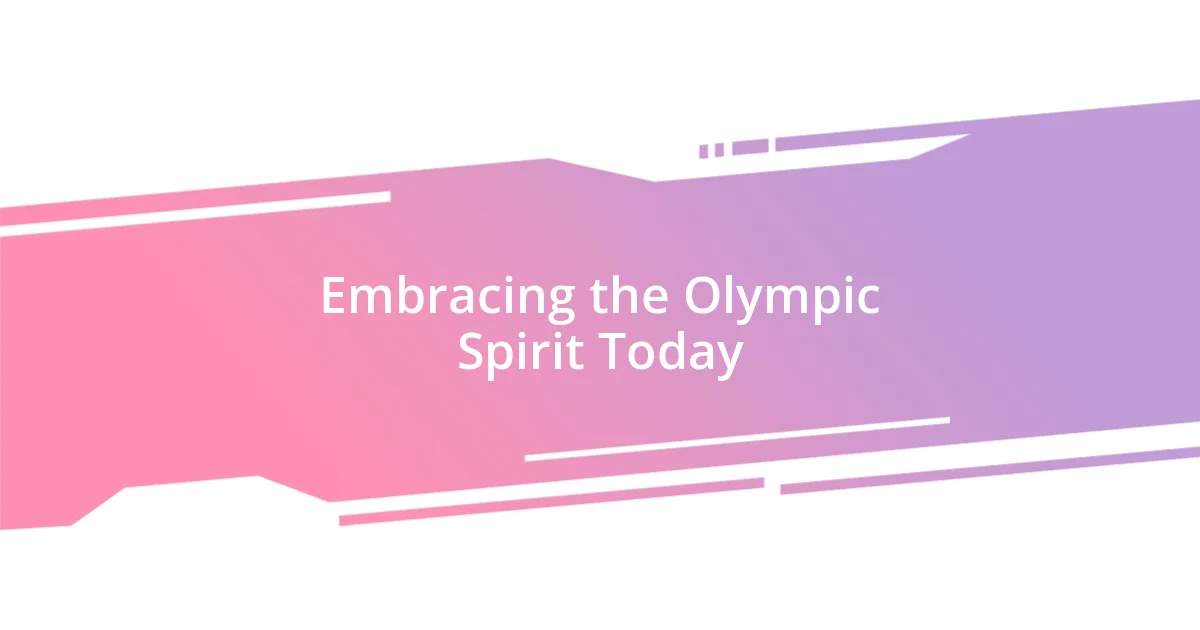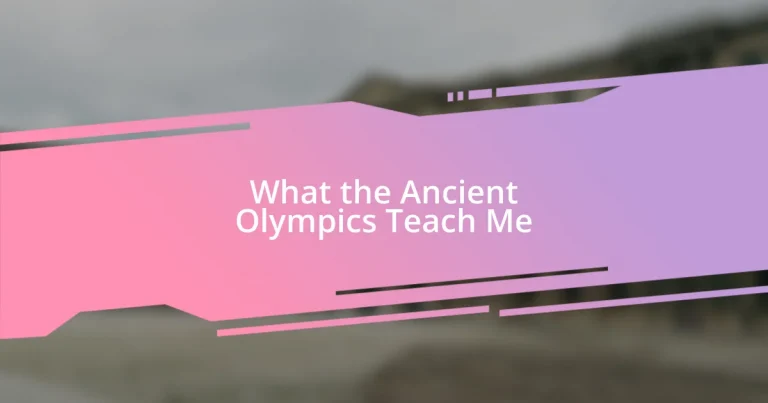Key takeaways:
- The Ancient Olympics began in 776 BC as a religious festival honoring Zeus, evolving into a panhellenic celebration that united diverse communities through competition.
- Ancient athletes engaged in rigorous training that emphasized discipline, commitment, and personal sacrifice, reflecting values that resonate in modern sports culture.
- Embracing the Olympic spirit today involves mental resilience, diverse training methods, and community support, which can inspire personal growth and excellence in various aspects of life.

Origins of the Ancient Olympics
The Ancient Olympics began in 776 BC in Olympia, Greece, primarily as a religious festival honoring Zeus. Picture the excitement that filled the air as athletes from various city-states gathered, all eager to showcase their skills. Doesn’t it make you wonder what it must have felt like to be one of those athletes, standing on the starting line, surrounded by the cheers of thousands, all in the name of piety?
I often think about how this celebration was not just about winning; it was also deeply woven into the cultural fabric of Greek society. Competitors took home not just trophies but also fame and honor that could elevate their communities. Can you imagine the pride swelling in someone’s chest as they represented their city? Those moments resonate through history, reflecting the human desire for recognition and community.
As the games evolved, they became more than a local event. They transformed into a panhellenic festival, attracting participants and spectators from all corners of the Greek world. This expansion raises an intriguing question: How does a simple ritual morph into a unifying force that rallies diverse people together? It’s fascinating to see how the spirit of competition can transcend boundaries, creating a shared cultural heritage that still echoes in modern sporting events.

Training Regimens of Ancient Athletes
When delving into the training regimens of ancient athletes, I find it fascinating how rigorous and disciplined their practices were. Unlike the structured training methods we see today, these athletes focused intensely on physical conditioning through a blend of strength training, endurance exercises, and skill development. Imagine waking up before dawn, with the fresh breeze on your face, ready for a day filled with sweat and perseverance—the kind of dedication that not only builds physical strength but also sharpens the mind.
Their training routines often included activities like:
- Running long distances for stamina
- Wrestling and boxing to enhance strength and agility
- Practicing specific sports, such as discus or javelin throwing
- Engaging in gymnastic exercises to maintain flexibility and control
- Following strict diets rich in protein, including barley and meat for optimum fuel
Reflecting on these practices, it’s clear to me that their commitment was a testament to the value they placed on excellence, not just in competition but in personal discipline. The echoes of their training resonate in our contemporary pursuit of athleticism, reminding me that the foundations of dedication and hard work are timeless traits that transcend ages.

Lessons in Discipline and Commitment
Discipline and commitment are at the heart of what made the Ancient Olympics so remarkable. From my perspective, witnessing their unwavering dedication is truly inspiring. I can’t help but draw parallels to our own lives—think about that project you’ve worked tirelessly on or a goal that felt just out of reach. The ancient athletes faced similar challenges; they sacrificed their time and comfort for a mere chance at glory. Every grueling workout and every strict meal they consumed wasn’t merely a physical trial, but a demonstration of their resolve.
What stands out to me is how these athletes committed years to honing their craft, often from a young age. It reminds me of my own journey in mastering a skill. I remember the countless evenings I spent practicing a musical instrument until my fingers felt raw. That sense of dedication parallels what I imagine an ancient Greek athlete experienced. Their relentless pursuit of excellence teaches us that commitment is not just about the end goal; it’s about the discipline to show up every single day.
Furthermore, their training was deeply ingrained in a culture that revered hard work and sacrifice. I find this fascinating, especially when considering how our world today sometimes struggles with sustained focus. It’s as if we’ve become scattered, chasing quick pleasures rather than deeply investing in a long-term vision. The ancient Olympians had their eyes on the prize, fostering a commitment that echoes through time, reminding us that real achievements come from consistent effort, day in and day out.
| Aspect | Ancient Olympians |
|---|---|
| Training Style | Rigorous physical training with a focus on discipline. |
| Commitment Level | Years dedicated to mastering their sport for a chance at glory. |
| Mindset | A relentless pursuit of excellence shaped by cultural values. |
| Personal Sacrifice | Involvement required sacrifice in time, comfort, and social life. |

Strategies for Modern Competitors
Embracing the competitive spirit of the Ancient Olympics can provide invaluable strategies for modern athletes. One such strategy I often reflect on is the importance of mental resilience. Those ancient competitors didn’t just rely on their bodies; they trained their minds to push beyond comfort zones. I recall a particularly tough marathon I participated in, where every mile felt heavier than the last. I found myself channeling the philosophy of those ancient athletes, reminding myself that discomfort is a stepping stone toward greatness. How often do we allow our minds to give up before our bodies have reached their limit?
Another key takeaway is the value of diverse training methods. The ancients were not one-dimensional in their approach; they combined running, wrestling, and even gymnastics. This multifaceted regimen not only developed their physical capabilities but also kept their training fresh and engaging. I find it essential to change up my routine regularly. Personally, I’ve seen tremendous benefits by incorporating activities like yoga and swimming into my regimen to enhance flexibility and endurance. Have you ever experienced a breakthrough in your performance simply by switching up your training?
Lastly, I believe networking and learning from fellow competitors is vital, just as it was for those athletes in ancient Greece. They learned from each other, sharing techniques and strategies, which is something I value in my own training. I’ve often reached out to fellow runners for tips about pacing or nutrition, and those conversations have enlightened my practices. Isn’t it inspiring to think that collaboration and shared knowledge can lift us all to new heights? That sense of community fosters growth in ways that solitary training simply cannot replicate.

Embracing the Olympic Spirit Today
The Olympic spirit, which embodies perseverance and camaraderie, can significantly enrich our lives today. I remember a time I participated in a charity run where the atmosphere was electric with shared passion. Runners and supporters from all backgrounds came together, encouraging each other. This unity reminded me of the ancient Games, where athletes celebrated not just competition but also fellowship. How often do we take a moment to appreciate the power of community around us?
I find that embracing this spirit encourages us to tackle challenges with a different mindset. For instance, when I faced a setback in my career, rather than succumbing to despair, I drew strength from the resilience of those ancient Olympians. Their ability to bounce back from defeat taught me that true success is often built on overcoming obstacles. Have you ever noticed how setbacks can sometimes propel us forward in unexpected ways? It’s all about reframing our challenges as opportunities for growth.
Additionally, the Ancient Olympics inspire me to pursue excellence in my daily life—whether that’s at work or in personal aspirations. There’s a certain thrill I feel when I strive for a goal, similar to the excitement ancient athletes must have experienced before their competitions. One day, while attempting a particularly challenging recipe, I found myself channeling that same determination. Each failed attempt taught me something valuable, much like the rigorous training of those ancient competitors. Isn’t it incredible how the Olympic spirit can infuse our everyday endeavors with purpose and resilience?












